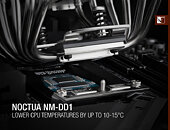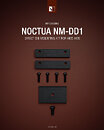- Joined
- Oct 9, 2007
- Messages
- 47,427 (7.51/day)
- Location
- Hyderabad, India
| System Name | RBMK-1000 |
|---|---|
| Processor | AMD Ryzen 7 5700G |
| Motherboard | ASUS ROG Strix B450-E Gaming |
| Cooling | DeepCool Gammax L240 V2 |
| Memory | 2x 8GB G.Skill Sniper X |
| Video Card(s) | Palit GeForce RTX 2080 SUPER GameRock |
| Storage | Western Digital Black NVMe 512GB |
| Display(s) | BenQ 1440p 60 Hz 27-inch |
| Case | Corsair Carbide 100R |
| Audio Device(s) | ASUS SupremeFX S1220A |
| Power Supply | Cooler Master MWE Gold 650W |
| Mouse | ASUS ROG Strix Impact |
| Keyboard | Gamdias Hermes E2 |
| Software | Windows 11 Pro |
Noctua today introduced its new NM-DD1 direct die kit. Developed in cooperation with professional overclocker and direct die cooling expert Roman "der8auer" Hartung, the NM-DD1 is a mounting spacer kit that makes it possible to use a wide range of Noctua CPU coolers on delidded AMD AM5 processors. Removing the processor's integrated heat spreader (delidding) and putting the heatsink directly onto the dies allows for much more efficient thermal transfer and can thereby lower CPU temperatures significantly, with typical gains in the range of 10-15°C.
"Delidding and direct die cooling will void your CPU's warranty and bear a certain risk of damaging it, so this certainly isn't for everyone," explains Roland Mossig (Noctua CEO). "However, the performance gains to be had are simply spectacular, typically ranging from 10 to 15°C but in some cases, we've even seen improvements of almost 20°C in combination with our offset mounting bars, so we're confident that this is an attractive option for enthusiast users. Thanks to Roman for teaming up with us in order to enable customers to implement this exciting tuning measure with our CPU coolers!"


Removing the CPU's integrated heat spreader (delidding) and putting the heatsink directly onto the dies using liquid metal thermal compound significantly improves thermal transfer and can typically reduce CPU temperatures by as much as 10-15°C. This increased thermal headroom can either be used to drastically reduce fan speeds and noise levels or, if the CPU allows, to achieve higher turbo boost frequencies.
For further performance gains, the NM-DD1 can be combined with Noctua's new offset AM5 mounting bars (NM-AMB12, NM-AMB13, NM-AMB14, NM-AMB15) that allow users to achieve lower temperatures not only on regular AM5 CPUs, but also on delidded ones as the pressure will be more concentrated over the CCDs. Typically, using the offset mounting option with direct die cooling can yield additional gains of up to 2°C.
The NM-DD1 contains spacers that are put underneath the heatsink's fastening bracket(s) in order to make up for the height of the removed heat spreader as well as custom, longer screws that make it possible to reinstall the fastening brackets with the spacers in place. All other parts that are required for delidding and direct die cooling (delidding tool, direct die frame for protecting the CPU, liquid metal thermal compound) must be purchased separately.
The NM-DD1 can be ordered exclusively via Noctua's website for a service charge of EUR 4.90. Alternatively, customers can 3D-print the spacers contained in the NM-DD1 kit at home using the STL files shared at Printables.com (NM-DDS1 spacers for coolers with two-piece fastening brackets and 83 mm mounting-pitch, NM-DDS2 spacers for coolers with a single-piece fastening bracket and 78 mm mounting pitch). Installing the fastening bracket(s) with the printed spacers will require four M3x12 screws (for NM-DDS1) or a single M4x10 screw (for NM-DDS2).
For more information, visit this page.
View at TechPowerUp Main Site
"Delidding and direct die cooling will void your CPU's warranty and bear a certain risk of damaging it, so this certainly isn't for everyone," explains Roland Mossig (Noctua CEO). "However, the performance gains to be had are simply spectacular, typically ranging from 10 to 15°C but in some cases, we've even seen improvements of almost 20°C in combination with our offset mounting bars, so we're confident that this is an attractive option for enthusiast users. Thanks to Roman for teaming up with us in order to enable customers to implement this exciting tuning measure with our CPU coolers!"


Removing the CPU's integrated heat spreader (delidding) and putting the heatsink directly onto the dies using liquid metal thermal compound significantly improves thermal transfer and can typically reduce CPU temperatures by as much as 10-15°C. This increased thermal headroom can either be used to drastically reduce fan speeds and noise levels or, if the CPU allows, to achieve higher turbo boost frequencies.
For further performance gains, the NM-DD1 can be combined with Noctua's new offset AM5 mounting bars (NM-AMB12, NM-AMB13, NM-AMB14, NM-AMB15) that allow users to achieve lower temperatures not only on regular AM5 CPUs, but also on delidded ones as the pressure will be more concentrated over the CCDs. Typically, using the offset mounting option with direct die cooling can yield additional gains of up to 2°C.
The NM-DD1 contains spacers that are put underneath the heatsink's fastening bracket(s) in order to make up for the height of the removed heat spreader as well as custom, longer screws that make it possible to reinstall the fastening brackets with the spacers in place. All other parts that are required for delidding and direct die cooling (delidding tool, direct die frame for protecting the CPU, liquid metal thermal compound) must be purchased separately.
The NM-DD1 can be ordered exclusively via Noctua's website for a service charge of EUR 4.90. Alternatively, customers can 3D-print the spacers contained in the NM-DD1 kit at home using the STL files shared at Printables.com (NM-DDS1 spacers for coolers with two-piece fastening brackets and 83 mm mounting-pitch, NM-DDS2 spacers for coolers with a single-piece fastening bracket and 78 mm mounting pitch). Installing the fastening bracket(s) with the printed spacers will require four M3x12 screws (for NM-DDS1) or a single M4x10 screw (for NM-DDS2).
For more information, visit this page.
View at TechPowerUp Main Site






